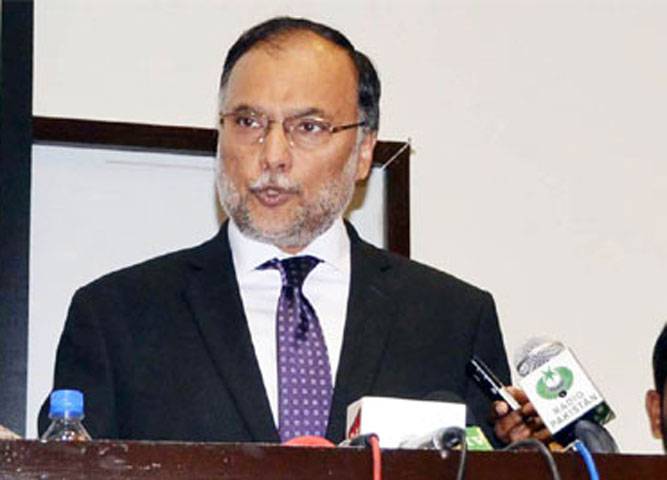Lahore - Interior Minister Ahsan Iqbal on Saturday — a day after Pakistan avoided ending up on a terror watch list by a global task force — said that the government will expedite steps to curb terror financing and money laundering.
Country's performance in the war against terrorism was better than others, but it still faced pressure from Washington, the minister said.
Pakistan on Friday escaped a motion to put it on a 'grey list' by the Financial Action Task Force, which met in Paris. The US and Britain had jointly submitted a letter to the FATF, nominating it for placement on the watch list.
Talking to reporters in Lahore, the interior minister said that a decision by the FATF to place Pakistan on the ‘grey list’ of the global money laundering watchdog will be made in June. “The resolution against us was on political grounds to pressurise Pakistan. We were on this watch list till 2015 and despite this we grew the country’s economy. It is wrong to speculate that this will have dire economic consequences on the country.”
Ahsan emphasised that Pakistan had made the best efforts to combat terrorism. “We are taking steps not to please the US but for our own benefit. We will follow our own agenda to achieve national goals.”
Responding to questions, Ahsan said that surgical strikes were being carried out on the country’s political stability.
The minister warned that Pakistan was facing conspiracies and the country’s enemies were working overtime to spread anarchy. He added that any person or institution moving the country towards anarchy could not be considered a friend.
Ahsan also mentioned the threat of a surgical strike that Pakistan had received from Indian army chief, adding that country was also faced with similar internal threats.
“We need to be united. Our neighbouring country is threatening us with surgical strikes and we will face this threat. But surgical strikes are also being carried out on the political stability in the country. There is no room for this. Why are we becoming our own enemy?”
The minister opined that the Panama Papers were used to achieve political objectives.
He said this was not unusual to have differences between political parties, but every party will have to bear the brunt of any designs to weaken democratic polity.
When asked about the Senate elections, Ahsan replied that some steps that had been taken were creating the impression that the process of ‘target killing’ was underway in politics.
According to the interior minister, the voter was no longer comparable to a primary school student, rather someone who had received a PhD in politics. “They [people] are well-informed and analyse everything. This is the reason that the PML-N, despite steps being taken against it, is not experiencing any political backlash. In fact, our political support is increasing.”
Ahsan stressed on the supremacy of the Parliament, calling it the most important institution in the country that gives birth to the constitution and other institutions.
“The Parliament decides on how many judges will be appointed in the Supreme Court or what the pension of a Supreme Court judge will be; it also gives birth to the structure of the judiciary. It decides on the prime ministerial criteria and who will be the next premier.”
“The Parliament is the representative of the people of Pakistan,” he added.
Earlier addressing a workshop, Ahsan said the youth had a crucial role in economic development of a country. He said the future of Pakistan was linked with its youth.
Ahsan said, “We have to train the youth as per our future requirements. The incumbent government is making concerted efforts to make the youth an asset of the country.”
The interior minister said, “We are digitally empowering the youth to ensure their contribution in the process of progress and prosperity. Pakistan is included in the countries where youth is in majority.”
He emphasised the need for implementing the resolutions of the United Nations, including the one that sought amicable resolution of the long-standing Kashmir dispute.






